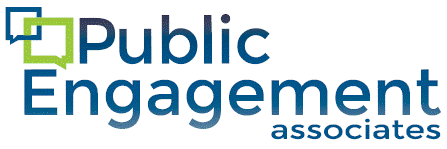



PROJECTS
Important Engagement Projects
DC Mayor's Office on Asian and Pacific Islander Affairs, 2015, 2016, 2018, 2021.
A series of public meetings in Historic Ellicott City, MD, to focus on the recovery and rebuilding of the city after a massive flood.
PEA is facilitating a year-long process with the University of Maryland's National Center for Smart Growth to ensure that disadvantaged business owners, workers & residents across the country benefit from new neighborhood investments in financial health, wealth, and stability.
Thrive 2050 is a new countywide plan and policy document that will guide future growth and development in Montgomery County, MD, over the next 30 years.
PEA worked with the lead consultant, WXY Studios, to organize two robust phases of community engagement for the Prince George's County Public Schools' Comprehensive Boundary Initiative in 2020 and 2021.
Some of the community and stakeholder engagement projects we've worked on in recent years can be found below. The five projects highlighted on the left illustrate the range of our work.
-
National Summit to Protect Our Democracy, for Stand Up Republic, 2018, 2019.
-
Congressional Hispanic Caucus Institute Annual Leadership Conference (multiple-day), 2017-2023.
-
Series of Ward 7 and Ward 8 Action Summits, DC Mayor, then Councilmember Vincent Gray, 2012, 2014, 2016, 2020.
-
NoMa Parks Foundation: Virtual meetings to share information and solicit community input for the potential designs of new public spaces such as Swampoodle II Park and Dave Thomas Circle.
-
A two-day Listening Session for National Alliance on Mental Illness in 2015 to develop effective strategies to engage: (1) individuals experiencing the early or first signs of mental illness (upstream engagement); and (2) individuals who have untreated or ineffectively treated mental illness (downstream engagement).
Engagement Projects with a Central Racial Equity Focus
The PEA team is committed to supporting the development of racially equitable community outcomes. Recent projects include:
-
Purple Line Corridor Coalition:
Over the last three years, we have supported the Purple Line Corridor Coalition in launching their governance system; organizing and facilitating their annual meetings of 150-200 people (in person and virtually); leading resident & stakeholder engagement for a corridor housing action plan and small business support action plan; and currently leading their equitable workforce development action planning into 2022. -
Metropolitan Washington Council of Governments Region Wide Fair Housing Initiative:
PEA worked with Ochoa Collaborative and eight local jurisdictions to facilitate a robust community participation and comment process (more than two dozen virtual events around the region) for the Metropolitan Washington Council of Governments' (COG) Regional Housing Equity Plan (also known as the Analysis of Impediments to Fair Housing Choice or AIl). -
Montgomery County Public Schools:
PEA worked with the lead consultant, WXY Studios, to organize dozens of community-based meetings for Montgomery County Public Schools' District Wide Boundary Analysis. In two phases (2019-2020), we engaged more than 3,000 people (in person and virtually) to further the school system's objectives of facilitating equitable and optimal outcomes in facility use, student diversity within schools, student proximity to schools, and stability of student assignments. Several meetings were conducted in Spanish, French, and Amharic. The school system's Board of Education will use the analysis when making decisions about future school boundary changes. -
Industry Recovery Blueprint for the DC Department of For-Hire Vehicles (DFHV): Washington, DC's for-hire industry has been hit hard by the COVID-19 pandemic and the resulting public health restrictions. PEA partnered with DFHV throughout 2021 to help the Department find ways to ensure the taxi industry has a genuine pathway post-pandemic. Our team engaged all major taxi companies, hundreds of taxi drivers, and dozens of city leaders in discussions to determine a robust set of strategies and actions for a "new normal." The work culminated with a recently published Industry Recovery Blueprint that charts a path forward for this weakened industry in the District.
